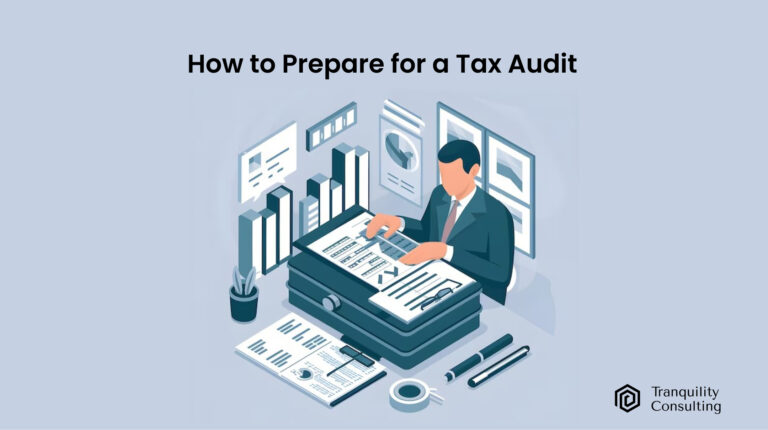Receiving a notice of an income tax audit can be intimidating, but understanding the process and preparing properly can ease your anxiety. Whether you’re an individual taxpayer or a business owner, being well-prepared is crucial to navigating an audit successfully. This guide will walk you through effective strategies for preparing for an income tax audit, ensuring you can handle the situation confidently.
What is an Income Tax Audit?
An income tax audit examines an individual’s or business’s financial records and tax returns by the Internal Revenue Service (IRS) or state tax agency. Audits are conducted to verify the accuracy of the reported income, expenses, and deductions. Various factors, including discrepancies in tax returns, large deductions, or random selection by the IRS, can trigger them.
Reasons for an Audit
Understanding why you may have been selected for an audit is essential. Common reasons include:
- Discrepancies in Reporting: Mismatched information between your tax return and documents submitted to the IRS can raise flags.
- High Deductions or Credits: Claiming unusually high deductions compared to your income can prompt an audit.
- Self-Employment Income: Self-employed Individuals often face more scrutiny, especially if they report significant deductions.
- Random Selection: Some audits are entirely random and do not indicate wrongdoing.
Step-by-Step Guide to Prepare for an Income Tax Audit
1. Stay Calm and Assess the Situation
Receiving an audit notice can be stressful, but remaining calm is essential. Take time to read the notice carefully to understand what is being audited and what documents are required. The notice will specify whether the audit will occur via mail (correspondence audit) or in person (field audit).
2. Organize Your Records
Start gathering all relevant documents related to your tax return for the year being audited. This includes:
- Tax Returns: Have copies of the tax returns for the year in question.
- W-2s and 1099s: Collect all income statements and any other income documents.
- Receipts: Organize receipts for all deductions claimed, including business expenses, medical expenses, and charitable contributions.
- Bank Statements: Prepare bank statements that correspond to your income and expenses.
- Correspondence: Keep any correspondence you’ve had with the IRS regarding your tax return.
3. Review Your Tax Return
Carefully review your tax return for any mistakes or discrepancies. Look for errors in reporting income, miscalculated deductions, or omitted information. If you identify any errors, it’s better to acknowledge them upfront than to let the auditor discover them during the process.
4. Seek Professional Help
Consider hiring a tax professional or CPA with experience in audits. They can provide valuable assistance in preparing for the audit and representing you. A professional can help clarify complex tax issues and protect your rights. (Tranquility Consulting can represent you during the audit and provide valuable assistance)
5. Prepare for the Interview
You may need to meet with an IRS auditor if your audit is in person. Here’s how to prepare for the interview:
- Know Your Facts: Be familiar with your tax return and the documents you provide.
- Practice: Rehearse potential questions and answers with your tax professional.
- Be Honest: Always answer questions truthfully. If you don’t know the answer, it’s better to admit it than to guess.
6. Understand Your Rights
As a taxpayer, you have rights during the audit process, including:
- The Right to Representation: A tax professional can represent you during the audit.
- The Right to Appeal: If you disagree with the audit results, you can appeal the decision.
- The Right to Privacy: Your personal information should be kept confidential.
7. Respond to the Auditor’s Requests Promptly
Once the audit begins, respond promptly to requests for additional information or documentation. Delays can complicate the audit process and may lead to further scrutiny. Ensure all communications are documented.
8. Keep Records of Everything
Throughout the audit process, maintain detailed records of all correspondence and documents submitted to the auditor. This will help you track what has been provided and may be helpful if you need to appeal the audit findings.
9. Plan for Possible Outcomes
Prepare for the possibility of various outcomes, including:
- No Changes: The auditor may find that your tax return is accurate and no changes are needed.
- Adjustments: The auditor may propose changes, resulting in a higher tax bill.
- Penalties: You may sometimes face penalties if discrepancies are found.
10. Learn from the Experience
Regardless of the audit outcome, use this experience to improve your tax practices in the future. Consider maintaining more organized records, utilizing tax software, or working with a tax professional regularly.
Conclusion
Preparing for an income tax audit can be daunting, but with the right approach and thorough preparation, you can confidently navigate the process. Remember to stay organized, seek professional assistance if needed, and understand your rights as a taxpayer. Following these steps can reduce stress and ensure a smoother audit experience.
FAQs
- What triggers an income tax audit?
Income tax audits can be triggered by discrepancies in reporting, high deductions, self-employment income, or random selection.
- How can I prepare for an income tax audit?
Gather relevant documents, review your tax return, consider professional help, and stay organized.
- What documents should I keep for an audit?
Keep copies of tax returns, W-2s, 1099s, receipts, bank statements, and any correspondence with the IRS.
- Can a Tranquility Consulting represent me during an audit?
Tranquility Consulting can represent you during the audit and provide valuable assistance.
- What rights do I have during an income tax audit?
You have the right to representation, appeal audit results, and keep your personal information confidential.
If you have any questions or need business-related tax consulting advice, please contact us at: [email protected]





